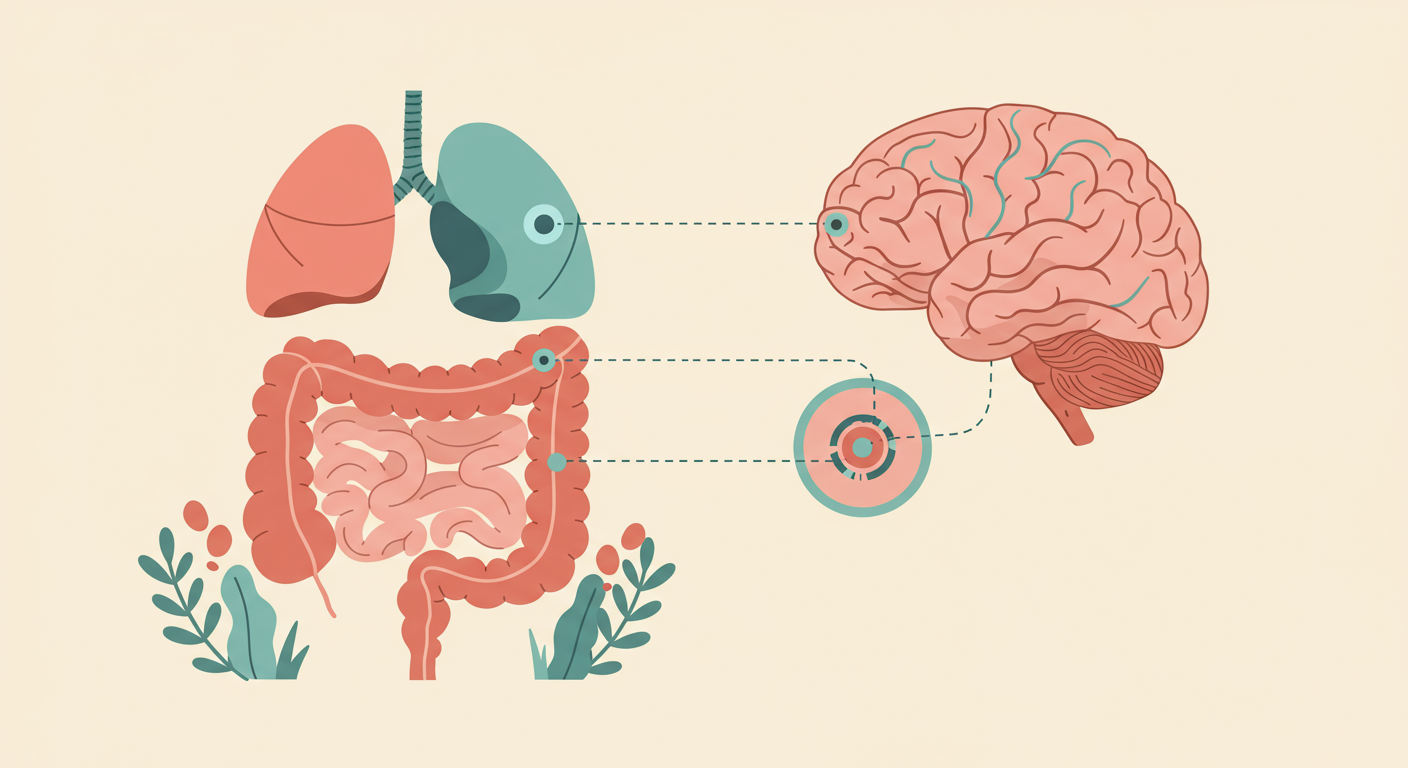A Healthy Gut, A Happy You: Exploring Ashwagandha's Link to Digestive Wellness
A Healthy Gut, A Happy You: Exploring Ashwagandha's Link to Digestive Wellness

Unlocking Digestive Harmony with Ashwagandha
In our quest for overall well-being, the importance of a healthy digestive system cannot be overstated. This article delves into the fascinating connection between Ashwagandha, a revered adaptogenic herb, and digestive wellness, exploring how it may support gut health, alleviate stress-related digestive issues, and influence the crucial gut-brain axis. We will unpack the science behind Ashwagandha's anti-inflammatory properties, its potential role in modulating the gut microbiome, and practical ways to incorporate it for better digestive comfort and a happier, healthier you.
Ashwagandha: An Adaptogen for Modern Times
Ashwagandha (Withania somnifera) is an ancient medicinal herb, prominent in Ayurvedic medicine for thousands of years. Often referred to as 'Indian Ginseng,' it is classified as an adaptogen, meaning it helps the body adapt to various stressors, both physical and psychological. Its name literally translates to 'smell of a horse,' alluding to its unique aroma and its traditional belief in bestowing the strength and vitality of a horse.

The primary active compounds in Ashwagandha are called withanolides, which are believed to be responsible for most of its therapeutic effects. These compounds contribute to its anti-inflammatory, antioxidant, and stress-reducing properties. While Ashwagandha is widely celebrated for its ability to calm the nervous system and improve sleep, growing evidence suggests its benefits extend significantly to digestive health.
What Makes Ashwagandha an Adaptogen?
Adaptogens are a unique class of herbs that help normalize physiological functions and maintain homeostasis (balance) in the body, particularly in response to stress. They work by modulating the body's stress response system, specifically the hypothalamic-pituitary-adrenal (HPA) axis. By supporting this system, Ashwagandha helps the body manage stress more effectively, reducing its detrimental impact on various bodily functions, including digestion. This ability to 'adapt' is central to its holistic health benefits.
The Gut-Brain Axis: Your Second Brain
To understand how Ashwagandha might benefit digestion, we must first appreciate the intricate connection between our gut and our brain – often referred to as the 'gut-brain axis.' This bidirectional communication system links the central nervous system (brain) with the enteric nervous system (ENS), which is embedded in the lining of the gastrointestinal tract. The ENS is so complex it's sometimes called the 'second brain.'

Communication along the gut-brain axis occurs through various pathways, including the vagus nerve, hormones, neurotransmitters (like serotonin, much of which is produced in the gut), and immune system signals. Stress, anxiety, and emotions can directly influence gut function, leading to symptoms like indigestion, bloating, or altered bowel habits. Conversely, gut health can impact mood and cognitive function. This highlights why managing stress is crucial for digestive wellness.
Did You Know?
Approximately 95% of the body's serotonin, a key neurotransmitter that influences mood and feelings of well-being, is produced in the gut. This underscores the profound impact gut health can have on mental health.
Ashwagandha's Potential Impact on Digestive Wellness
Ashwagandha's adaptogenic and anti-inflammatory properties position it as a promising ally for digestive health. Its effects are not direct laxatives or digestive aids but rather work through modulating stress, inflammation, and potentially the gut microbiome, all of which are critical for optimal gut function.
Stress Reduction and Gut Function
One of Ashwagandha's most well-documented benefits is its ability to reduce stress and anxiety. Chronic stress is a significant disruptor of the gut-brain axis, leading to increased gut permeability (leaky gut), altered gut motility, and changes in gut microbiota composition. By lowering cortisol levels – the body's primary stress hormone – Ashwagandha can help mitigate these negative effects. Reduced stress can lead to:
- Improved Motility: Regular bowel movements and less incidence of constipation or diarrhea.
- Reduced Visceral Hypersensitivity: Less discomfort and pain perception in the gut.
- Enhanced Gut Barrier Integrity: Protecting against increased permeability and potential inflammation.
Anti-inflammatory Properties for Gut Health
Inflammation is a common underlying factor in many digestive disorders, from Irritable Bowel Syndrome (IBS) to more severe conditions. The withanolides in Ashwagandha possess significant anti-inflammatory properties. By modulating inflammatory pathways, Ashwagandha may help soothe an irritated gut lining and reduce systemic inflammation that can contribute to digestive discomfort and dysfunction. A calmer, less inflamed gut is better equipped to absorb nutrients and maintain its protective barrier.
Modulating the Gut Microbiome
Emerging research suggests that Ashwagandha may also influence the gut microbiome, the vast community of bacteria and other microorganisms living in our digestive tract. A balanced and diverse microbiome is crucial for digestion, immune function, and even mental health. Some studies indicate that Ashwagandha might promote the growth of beneficial bacteria while inhibiting harmful ones, thereby contributing to a healthier gut ecosystem. While more extensive human studies are needed in this area, the preliminary findings are promising for Ashwagandha's role in microbiome modulation and overall gut resilience.
Incorporating Ashwagandha into Your Wellness Routine
If you're considering Ashwagandha for digestive support, it's available in various forms. The most common are powdered root, capsules, and tinctures.

Here are some general tips:
- Dosage: Dosing can vary depending on the concentration of withanolides in the product. It's best to follow the manufacturer's recommendations or consult with a healthcare professional.
- Consistency is Key: Like many herbal supplements, Ashwagandha's benefits are often cumulative, meaning consistent use over several weeks or months is typically required to experience its full effects.
- Quality Matters: Choose high-quality supplements from reputable brands that provide standardized extracts, ensuring a consistent amount of active compounds.
- Timing: Some prefer to take it in the morning for sustained energy and stress support throughout the day, while others take it in the evening to aid relaxation and sleep, which indirectly supports gut health. Experiment to see what works best for you.
Important Consideration
Always consult with a healthcare professional before starting any new supplement, especially if you have existing health conditions, are pregnant or breastfeeding, or are taking other medications. While generally well-tolerated, Ashwagandha may interact with certain drugs or conditions.
Frequently Asked Questions About Ashwagandha and Digestion
Ashwagandha is not a direct cure for digestive diseases. However, by reducing stress, inflammation, and potentially balancing the gut microbiome, it may help manage symptoms and improve overall digestive comfort, especially for conditions exacerbated by stress. Always consult a healthcare professional for diagnosis and treatment of specific conditions.
The effects of Ashwagandha are typically not immediate. Most people report noticing benefits related to stress reduction and improved well-being after consistent use for several weeks to a few months. Digestive improvements, being linked to these broader effects, may also take a similar timeframe.
Ashwagandha is generally well-tolerated. However, in some individuals, especially at high doses, it may cause mild digestive upset, such as stomach upset, diarrhea, or vomiting. Starting with a lower dose and gradually increasing it can help minimize these potential effects. If you experience persistent discomfort, discontinue use and consult a doctor.
Yes, Ashwagandha can interact with certain medications, including immunosuppressants, sedatives, thyroid hormones, and drugs for diabetes or high blood pressure. It may also amplify the effects of other stress-reducing or sleep-inducing supplements. It's crucial to consult a healthcare provider before combining Ashwagandha with other supplements or medications.
Summary: Ashwagandha for a Balanced Gut
The journey to optimal gut health is multifaceted, often requiring a holistic approach that addresses diet, lifestyle, and stress management. Ashwagandha, with its powerful adaptogenic and anti-inflammatory properties, emerges as a valuable natural aid in this endeavor. By supporting the body's ability to cope with stress and potentially modulating gut inflammation and the microbiome, this ancient herb offers a promising avenue for those seeking to enhance their digestive wellness and foster a happier gut-brain connection.
Key Takeaways:
- Adaptogenic Benefits: Ashwagandha helps the body manage stress, which is a major factor in digestive issues.
- Gut-Brain Axis Support: By reducing stress, Ashwagandha can positively influence the communication between the gut and brain.
- Anti-inflammatory Action: Its withanolides may help soothe gut inflammation, promoting a healthier digestive lining.
- Microbiome Modulation: Emerging evidence suggests it may support a balanced and diverse gut microbiome.
- Holistic Approach: Ashwagandha works best as part of a comprehensive wellness strategy that includes a healthy diet and lifestyle.
- Consult a Professional: Always seek medical advice before introducing new supplements, especially for digestive concerns.